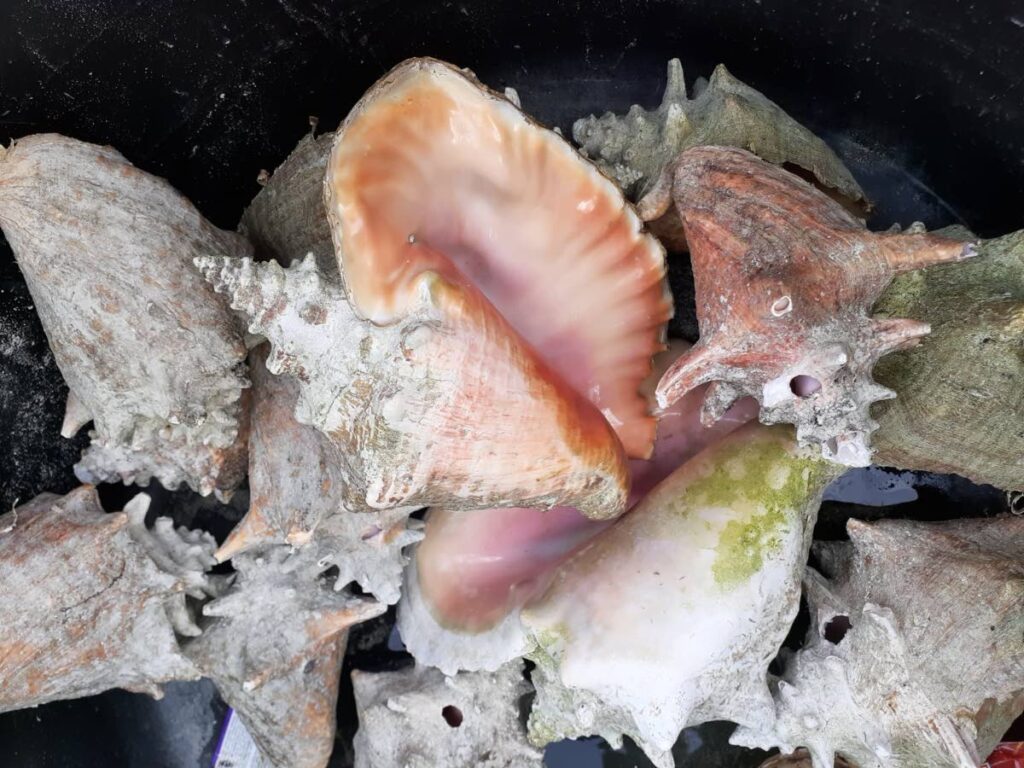Queen conch under threat: overharvesting leads to sea snail's decline

While the queen conch (Lobatus gigas) is a popular local delicacy that is often included in many dishes, aquatic ecologist Dr Ryan S Mohammed will prefer to see these sea snails included on a list of protected animals.
Mohammed is calling for their protection in TT given researchers fear they are being overhunted.
He told Newsday Kids, “When people are collecting conchs, they are doing so where they are aggregating to reproduce.
“When people do this, and collect them in large quantities, they are actually killing via breeding populations.
“Queen conch used to be a major fishery in Tobago, but their population is decreasing.
“It was common to find them in Speyside, the Buccoo Reef and the Bon Accord Lagoon," he said but now people are finding fewer.
Apart from being overconsumed, queen conchs are also overharvested for their exquisite shells which are used for a variety of purposes including making souvenirs for tourists.
Mohammed explained why this practice is unsustainable.
“When you see people selling conch shells, they would have a wide range of sizes because some tourists like to get the big ones, and some like to get the smaller ones.
“However, the problem is that small ones wouldn’t have been able to reproduce and with the large ones, you just removed a proper breeding adult.
“It takes them more than a decade to get that big shell. So when you see people with these shells, that’s a very old animal.”
When young conchs hatch, they don’t begin growing a shell right away.
Instead, they’ll have a pelagic stage where they’ll swim freely in the water for a few months.
They’ll start growing their shells at the end of this stage and it will take at least ten years for the shell to grow properly.
For now, Mohammed is calling for a temporary ban on the harvesting of queen conchs in TT.
If this is done, Mohammed thinks researchers will be able to get more data on the health of their population, give these sea snails a chance to replenish and give authorities time to plan a managed conch fishery as is already being done in some islands.
But overharvesting isn’t the only way people are contributing to the decline of these sea snails.
Over the past several decades, people have consumed a significant portion of the earth’s resources which has led to increased greenhouse gases being emitted and an increased warming of the earth.
This increased warming has caused prolonged changes in climate patterns around the world and sparked what is now know as the global climate change phenomenon.
Given queen conchs lay their eggs in seagrass nests, Mohammed said they require specific conditions in their habitats – like healthy seagrass – to successfully reproduce.
A 2018 study conducted under the Commonwealth Marine Economies Programme noted that human stressors on the environment, including climate change, have already led to 29 per cent of the world’s seagrass stock being destroyed.

However, it’s not only what is already lost that people should be worried about as the study also showed that the world is losing as much as seven per cent of its seagrass annually.
Seagrass loss in TT due to climate change, coupled with losses due to marine pollution, can affect the ability of queen conchs to successfully reproduce thus leading to a decline in their population.
If this sounds scary, imagine there are many other ways climate change is affecting the queen conch and other animals.
Like every animal, the queen conch plays a vital ecological role especially when they are found in coral reefs.
Mohammed explained, “They are grazers, so they would eat a lot of your surface algae and substrate. So that will allow the coral to actually have room to grow.
“They will also eat a lot of algae that are among the seagrass, so that the seagrass could have better space to grow.
“It’s all a balance and connected because the ecological function of the seagrass is important as they remove excess nitrates and ammonia from the water.
“We need the conch present to maintain a proper vegetational balance in the ecosystem because without the conch, you’ll have an explosion in growth of the different kinds of algae which will in turn have a trickle-down effect.”

Comments
"Queen conch under threat: overharvesting leads to sea snail’s decline"